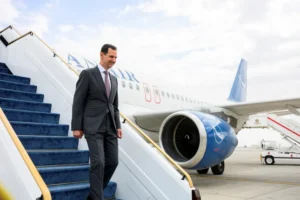
State media in the kingdom claimed late Thursday that Saudi Arabia is in discussions with Syria about reopening its embassy there for the first time in ten years. This is the latest diplomatic shuffle in the area.
The announcement on official television came after Chinese-mediated negotiations in Beijing, where Saudi Arabia and Iran decided to resume diplomatic relations after years of hostilities. Only with the assistance of Iran and Russia, which made a historic call to Oman earlier in the day, has Syrian President Bashar Assad been able to hold onto power in the Mediterranean country that was shaken by the 2011 Arab Spring.
Late on Thursday, a report on Saudi state media acknowledged talks between the kingdom and Damascus and cited an anonymous official in the country’s foreign ministry.
An anchor announced on broadcast that ongoing discussions have started with the Syrian Ministry of Foreign Affairs, commenting on what had been reported by some international media, according to a source in the ministry of foreign affairs who spoke to Al-Ekhbariyah. The provision of consular services is being discussed between officials in the kingdom and their colleagues in Syria.
Prior to the Saudi state TV statement, Arabic-language media had been reporting on the potential detente in recent days. According to unnamed Saudi and Syrian officials quoted in The Wall Street Journal, Russian intervention was a factor in the negotiations to reopen the embassies of those nations.
The talks were not quickly acknowledged by the Syrian state media. The Associated Press contacted officials in Saudi Arabia and Syria early on Friday, but neither nation responded to their inquiries right away.
Vladimir Putin called Sultan Haitham bin Tariq of Oman earlier on Thursday, which the Kremlin described as “the first high-level bilateral contact since the establishment of diplomatic relations” between the countries. In 1985, Muscat formed relations with the Soviet Union.
Oman has traditionally served as a conduit between the West and Iran. Talks about Yemen’s protracted conflict, in which Saudi Arabia supports the country’s exiled government against the Iranian-backed Houthi rebels who control its city, Sanaa, have recently taken place in Oman.
During the 2011 uprising that turned into a civil war in Syria, the kingdom supported the Syrian rebels against Assad. But a regional reconciliation has been developing recently. The devastating earthquake that struck Turkey and Syria last month sparked global sympathy and accelerated the process, with Saudi Arabia and other Arab nations sending assistance to Damascus.
On his trip to Oman in late February, Assad. He left for the United Arab Emirates on Sunday, another country that had in the past supported rebels attempting to overthrow his regime.
The foreign minister of Saudi Arabia has openly acknowledged that there is growing agreement among Arab nations that dialogue with Damascus is essential. According to Ahmed Aboul Gheit, secretary-general of the league, Saudi Arabia will host the upcoming Arab League summit in May, where the majority of nations expect to reinstate Syria’s membership after it was suspended in 2011.
U.S. officials have long been concerned about China’s and Russia’s interests in the Middle East because they see the area as essential to maintaining global energy prices, despite the fact that the country is pumping more crude oil than ever before and is less dependent on Saudi Arabian oil than it once was. As Moscow rallied allies to support OPEC output cuts to support global oil prices amid the coronavirus pandemic, Saudi Arabia and Russia have grown closer.
Additionally, since President Joe Biden assumed office and declared Saudi Arabia a “pariah” for killing Washington Post columnist Jamal Khashoggi in 2018, relations between the two countries have been at an all-time low. Requests for comment from the White House and the State Department were not quickly fulfilled.




